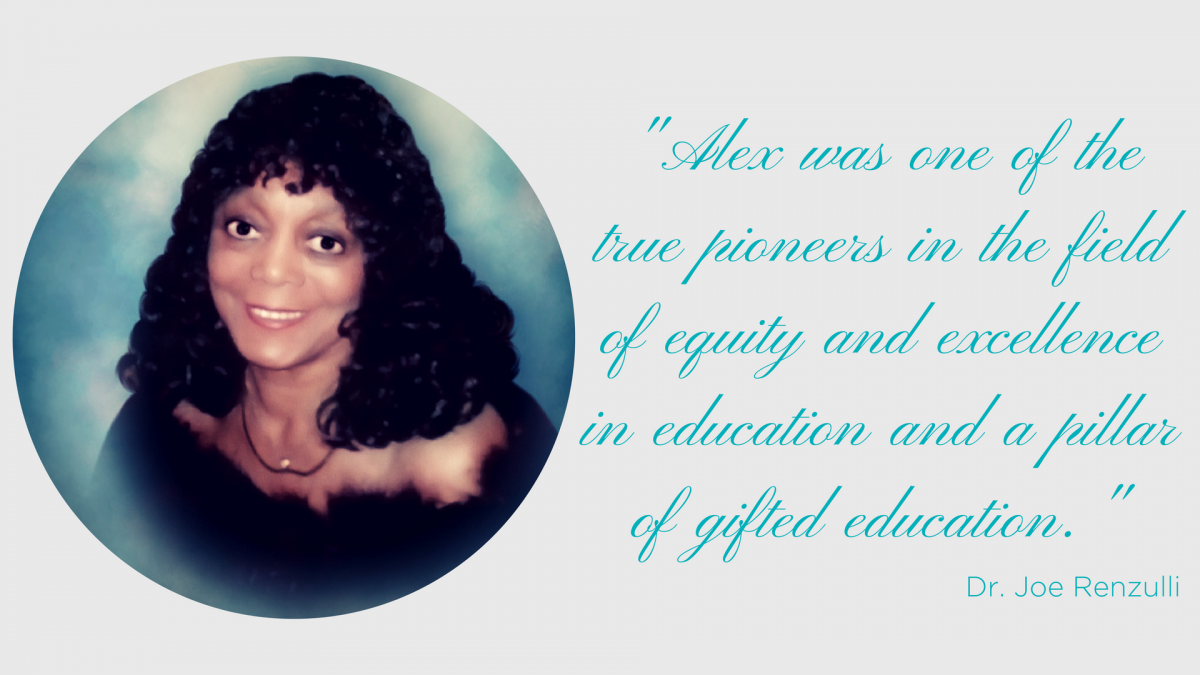NAGC works to support those who enhance the growth and development of gifted and talented children through education, advocacy, community building, and research
Joseph Renzulli
 As Black History Month comes to a close, we want to take the opportunity to recognize the contributions of Black leaders in the field of gifted & talented education. Today, we are sharing this post originally written in 2017 on Dr. Alexinia Baldwin who started the first gifted program for Black students in Alabama and went on to get her Ph.D. and make numerous contributions to the gifted field.
As Black History Month comes to a close, we want to take the opportunity to recognize the contributions of Black leaders in the field of gifted & talented education. Today, we are sharing this post originally written in 2017 on Dr. Alexinia Baldwin who started the first gifted program for Black students in Alabama and went on to get her Ph.D. and make numerous contributions to the gifted field.
Alexinia Young Baldwin ’71 Ph.D., professor emerita at the University of Connecticut and our dear friend and colleague, died on Jan. 21, 2017. Alex was one of the true pioneers in the field of equity and excellence in education and a pillar of gifted education. When she arrived at the University of Connecticut in 1968 with her lovely nine year old daughter Carlita, she began her path to a long and distinguished career that resulted in significant contributions and innovations in both the field of gifted education and education in general.
Alex started the first gifted program in the nation for African American students in the then-segregated schools in Alabama. Her experience in this ground breaking program was the basis of her research and the development of the Baldwin Identification Matrix, an instrument that provided a much broader set of identification criteria for examining the many areas of talent potential in young people. Upon graduation from UConn with her doctorate, she was recruited to the faculty of the State University of New York in Albany, a university that is commonly referred to as the Harvard on the Hudson, where she continued her research and developed one of the first gifted education teacher training programs in New York State.
Alex returned to UConn in 1988 as a professor and head of the Curriculum Department where she remained until her retirement in 2003. Her research focused on the education of gifted students, specifically on the recognition and development of the academic talents of children from low income and minority groups. She served as a Consultant to the United States Office of Civil Rights and had a lifelong passion and involvement in pursuing human rights and equity issues for all individuals. And she didn’t just talk and write about these issues. She actively participated in civil rights marches and she took the city of Birmingham to court in a civil rights case that resulted in the desegregation of all railroad terminal waiting rooms in Alabama. In other words, Alex did for railroad travel what Rosa Parks did for the use of public busses.
Her many activities included service as chair of as Connecticut’s Commission on the Status of Women and she also held offices in many professional organizations, including serving as president of the Capital District Chapter of 100 Black Women and as a board member of the Connecticut Women’s Hall of Fame Foundation. In 2004, the Neag School of Education at UConn honored Alex with the Distinguished Alumni Award and she also was named an outstanding Connecticut Woman Graduate in Leadership. She was a member of the Martin Luther King Colloquium of Scholars at Morehouse University and in 2004, she received the Distinguished Scholar Award from the National Association for Gifted Children.
Alex was active in community activities and philanthropy as she and her late husband, Brian, contributed significantly to the Jorgensen Theater and the Jorgensen Co-Stars Program. She also was the first African-American president of Altrusa International, a society dedicated to expanding and supporting leadership opportunities for women throughout the world. She also served as a role model to many young women, including her daughter Carlita Baldwin Cotton who completed her doctoral program at UConn is a professor at Goodwin College, following in her mother’s footsteps.
Most of all, Alexinia was an enthusiastic professor who loved teaching. She devoted her life to working with students, conducting research, and contributing to the education profession in ways that always focused on equity and social progress. Her colleagues considered her a role model, a leader, and a pioneer in her field. Always a woman of style and grace, she was valued for her mentorship, sense of humor, and willingness to always give her time and talent to anyone seeking her assistance.
Dr. Joseph Renzulli is a leader and pioneer in gifted education and applying the pedagogy of gifted education teaching strategies to all students.